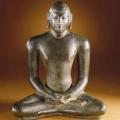50. Marie-Hélène Gorisse on Jain Epistemology
We're joined by Marie-Hélène Gorisse for a look at the Jain theory of knowledge.
Themes:
• M.-H. Gorisse, N. Clerbout, and S. Rahman, “Context-sensitivity in Jain strategical dialogues. A dialogical study of Siddharsigani's commentary on the Handbook of Logic,” Journal of Philosophical Logic 40 (2010), 633-62.
• M.-H. Gorisse, “The taste of the mango. A Jaina-Buddhist controversy on evidence,” International Journal of Jaina Studies 11 (2015), 1-19.
• M.-H. Gorisse, “Is inference a linguistic or a cognitive process? A line of divergence between Jain and Buddhist classifications,” in R. Leach and J. Pons (eds), Puṣpikā. Tracing Ancient India Through Texts and Traditions: Contributions to Current Research in Indology (Oxford: 2015), vol. 3, 1-23.
• M.-H. Gorisse (2016) “Logic in the tradition of Prabhacandra,” in J. Ganeri (ed.), The Oxford Handbook of Indian Philosophy online edition.







Comments
Congratulations
Congrats to you and Jonardon Ganeri for reaching the 50th episode of this spin off series.
Curious to know, will that special interview be Kit Patrick from the History of India podcast?
In reply to Congratulations by dukeofethereal
Special guest
That would be telling!
But, no actually (though I have met him in person! a real sweetheart).
The Naked Truth ?
The Jainists wish to establish the truth of their non-onesidedness theory not in any positive way, in particular not apriori, but by showing the falsity or incoherence of all onesidedness theories. Well two can play that game. At a more universal apriori perspective, we can see that, since non-onesidedness is incoherent when applied to itself, it must be false and some one or more onesidedness theories must be the truth. But non-onesidedness is not proposing a universal skeptical view [since such a view is incoherent by being self-refuting when applied to itself]. Rather, knowledge is possible only if you adopt a variety of onesidedness viewpoints.
Huh? I stand here and see that any onesidedness perspective is false because it doesn't capture the whole of the truth and one must adopt a variety of them [hopefully not any two or more that are inconsistent with each other]. But then I move back over there and see, from a non-skeptical perspective, that non-onesidedness doesn't provide any standard(s) for deciding which, among the variety of onesidedness paths to truth, to allow or adopt. But perhaps the Jainist theory does in that it only disallows any onesidedness theory that is inconsistent with some other onesidedness theory. But I better pick one of the two mutually incompatible onesidedness theories or I'll lose one standpoint on the truth. But what is the standard by which I do that? How am I going to be “able, as a human being, to draw an extensive and exhaustive classification of these different types of stance on the knowable”? What is the standard for inclusion or exclusion into this wondrous classification? Pick whatever I wish, someone is going to push me further outside and to a point where I see that that standard, especially any standard of inference, is onesided.
Brrrr! Over here it is getting very cold outside and, as more than just a matter of public morality on nudity, I really need to settle this so to decide whether to put my clothes back on.
Dignaga
Hi Peter,
I am not sure if I understood the position of the Jainas with regard to that of Dignaga or Dharmakirti, for instance in the example of the mango. If I give it a thought, basically only that of Dharmakirti sounds different because it requires an underlying principle, whereas both Jainas and Dignaga basically rely on the past experience, one or the other way. The fact that conjunction of taste and color is enough for Dignaga for a judgement is itself based on past experiences and hence a kind of induction. Isn't it?
Cheers!
In reply to Dignaga by Xaratustrah
Jains v Dignaga
I guess that's basically right, yes - they are both broadly inductive accounts. The difference might be that Dignāga has those very specific rules about needing to give positive examples and rule out counterwitnessing cases. But in fact I believe that the Jains and others absorbed Dignāga's account to some extent anyway so depending on the period, you might find that his view has been assimilated to that of the Jains.
Add new comment